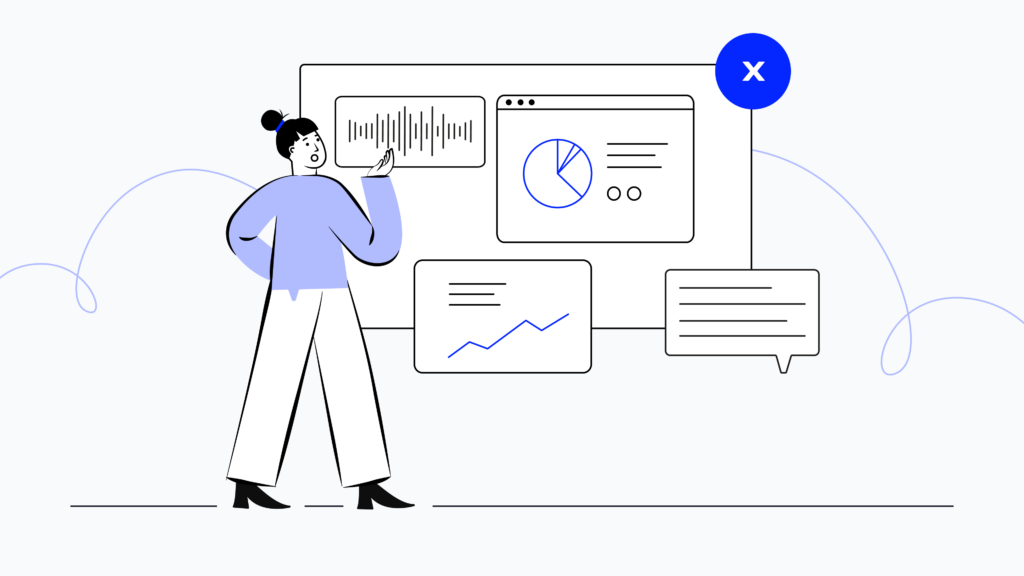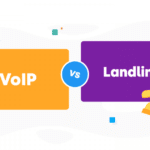VoIP Phone Dialers: How to Choose the Best for Your Business

When organizations worldwide needed their sales and customer service teams to continue working without office-based phone equipment during the pandemic, the VoIP market came to the rescue. In fact, the VoIP market reportedly increased by a massive 212% as a result.
These cloud-based software solutions let users take care of business communications over the internet. The result? Reduced downtime, better call quality, and increased productivity — all for a lower cost compared to traditional landlines.
That’s why sales and customer service teams need a VoIP dialer software solution that’s reliable, easy to deploy, and simple to integrate with existing systems. But where to start?
In this article, you’ll learn about how a VoIP phone dialer works, the difference between VoIP and traditional phone calls, what to look for in a VoIP dialer, and how they benefit your business.
Key takeaways:
- VoIP phone dialers offer significant cost savings compared to traditional landlines, with businesses potentially saving up to 50% on telephony costs.
- With VoIP technology, employees can make and receive calls from anywhere with a stable internet connection. Advanced features, such as call analytics and automated routing, streamline operations and enhance team efficiency.
- CloudTalk.io stands out as a versatile VoIP provider, offering over 50 advanced features designed to meet diverse business needs.
What Is a VoIP Phone Dialer?
A VoIP phone dialer is a software application that uses the internet instead of traditional Public Switched Telephone Networks (PSTNs) to dial phone numbers and receive calls.
Also known as a cloud-based phone system, VoIP auto dialer, IP telephony, or internet telephony, this convenient and cost-effective solution utilizes internet-enabled equipment.
With VoIP, there’s no need for physical phone lines or landline hardware. Instead, you can manage audio and video communications from your browser or smartphone. This gives you new opportunities for scalability, flexibility, and cross-platform communication that traditional wired phone systems don’t support.
From CRM integration and call analytics to video conferencing and automation, VoIP phone dialers include everything remote, hybrid, and office-based users need to remain productive. With that in mind, it’s no surprise that VoIP systems exploded in popularity during the pandemic in 2020.
Since then, virtual telephony has become the norm, with IT and operations managers eager to set up VoIP systems and reap the benefits of their advanced features.
How Does VoIP Dialer Software Work?
Rather than using analog signals, VoIP systems employ the Session Initiation Protocol (SIP). This is a set of standards for initiating, maintaining, modifying, and terminating real-time communications between IP devices, enabling users to make calls via internet broadband.
Want to know more about how VoIP works? Let us explain…
VoIP technology takes the video and audio signals from your voice or another multimedia content source and converts them into digital data packets. Then, it compresses and transmits those packets over an available IP network — sending them to a receiver that converts data signals back into audio signals, thereby facilitating seamless real-time communication.
A standard VoIP phone system requires three key elements:
- A VoIP-enabled device, such as a VoIP phone or software-based “softphone.”
- A router or modem that connects devices to the internet.
- A high-speed internet connection (at least 100 Kbps per phone line).
Alternatively, you can connect your existing telephony hardware to a VoIP phone dialer through an analog adapter or VoIP gateway. That way, you can turn smartphones, laptops, headsets, and speakers into advanced mobile telephony solutions without needing to invest in new equipment.
What’s the Difference Between VoIP and Traditional Phone Calls?
Many businesses still use conventional landline phone systems to support their service teams.
However, these traditional solutions are becoming increasingly expensive and outdated, leading IT managers to embrace VoIP systems that have the features and flexibility a growing enterprise needs.
For example, VoIP technology offers bonuses like virtual numbers, seamless application integration, and cost-effective international call plans — ideal for companies with remote employees or that frequently make long-distance calls.
On the other hand, a landline system’s scalability is limited by its physical infrastructure, which often requires hands-on maintenance support.
It’s worth noting that VoIP phone dialers rely on stable broadband connections and therefore might not be suitable for businesses that have concerns about network-related downtime. Still, with unlimited scalability and low call costs, VoIP comes out on top in most battles with traditional phone systems.
Still not sure what type of system to choose? Check out our VoIP vs landline comparison table to explore which solution would be best for your business.
What Are the Benefits of a VoIP Auto Dialer?
Considering whether a VoIP call center solution might boost your team’s performance and help your operatives work more efficiently?
These cloud-based systems can offer plenty of attractive benefits that’ll help you increase productivity and see a good return on your investment…
- Lower costs. The average business can save up to 50% on their telephony costs using VoIP. With no hardware expenses, affordable VoIP pricing options, and no ongoing maintenance fees, VoIP phone dialer services come along with several direct and indirect cost savings in both the short and long term.
- Limitless scalability. Unlike traditional phone systems that limit you to a certain number of lines, VoIP networks can grow with you seamlessly. That means you can support large-scale conference calls at the drop of a hat and effortlessly add or remove users as needed, all without sacrificing your communication quality.
- Increased flexibility. With a cloud-based VoIP system, your employees can make and receive calls anywhere with a stable internet connection. That’s great news for remote workers, suppliers, and customers alike, helping your teams deliver a reliable, seamless service regardless of where they choose to work.
- Enhanced efficiency. VoIP technology lets your business operate from portable phone numbers while supporting advanced communication and collaboration capabilities. From efficient call routing to reduced call-handing time, VoIP phone dialers have the functionality to shave minutes off every call.
- Advanced features. There are lots of things VoIP phone dialers can do that landlines can’t. For example, VoIP systems often facilitate multi-device compatibility, AI content analytics, and even voicemail-to-email services — all helping mobile workers solve problems faster.

Give your team the tools they need to perform better.
Unlock crystal-clear call quality. Onboard our VoIP solution in minutes and boost your team’s productivity by 10x.

What Should You Look For in a VoIP Dialer?
When you consider all of the above, it’s easy to see why so many growing businesses choose VoIP over a traditional landline.
Still, with so many options out there, selecting the right service can be an overwhelming task. So, what do you need to look for in a VoIP provider?

Call Quality and Reliability
Call quality is a top priority for organizations that are looking to embrace VoIP phone dialer software. So, it’s crucial to choose a provider with a strong track record of service uptime and reliability. Note: an excellent uptime is around 99.999%.
You can also learn about customers’ experience with a company by looking at review portals such as Capterra or G2.
We recommend paying especially close attention to customer support ratings. PwC found that 32% of customers stop doing business with a brand they love after only one bad experience. That proves how important it is to find a provider that can be available 24/7 to answer questions and troubleshoot service issues. Otherwise, you might risk losing a loyal customer to a competitor with better customer service.
What did Nokia achieve by centralizing customers’ data and SMS with Cloudtalk?
- 30% Increase in outbound success rates
- 10% Increase in agent productivity
- 25% Decrease in leads lost

Plans and Pricing
Ideally, look for the perfect balance between cost and features. There are free-to-use VoIP services like Skype or Microsoft Teams, but paid services are usually best for scaling businesses that want more than basic functionality.
Pro tip
Looking for Skype replacement? Check out our guide on how to port numbers from Skype.
Many providers — CloudTalk included! — offer a variety of packages with both standard and add-on features, such as:
- Custom reporting
- Voicemail management
- Enterprise-level security
- Workflow automation
- Developer support
- Live call monitoring
Some might even provide the option to tailor-make a solution for your company, allowing you to select only the functions and support you need to run your business.
Remember — cheaper plans might end up costing you more in the long run as service add-ons can come along with extra fees. So, it’s crucial to assess your VoIP phone system requirements and choose an appropriate plan that suits your immediate and long-term needs.
What did PlanRadar achieve by switching to CloudTalk’s VoIP system?
- Global reach with +160 international numbers
- 70% increase in call handling efficiency
- Superior call quality

Ease of Use
Perhaps the most important practical consideration is how simple a VoIP auto dialer is to set up and navigate. After all, there’s no point investing in a cutting-edge VoIP technology solution if your sales and customer service operatives struggle to use it!
A user-friendly VoIP phone dialer can ensure efficiency and boost productivity, supporting employees with accurate automatic call routing and minimizing the need for ongoing training and on-the-job support.
Overcomplicated VoIP platforms can lead to frustration and low productivity, reducing overall user adoption and limiting your return on investment. So, choose a provider that prioritizes user experience over unnecessary jargon and messy navigation to mitigate errors and revolutionize sales efficiency — just like we did for Revolut.
Features and Functionality
When evaluating functionality, consider features such as call quality, scalability, integration capabilities with existing tools, and user-friendly interfaces. Also, look for advanced features, like Call Transcription, that help sales and customer service teams learn from their mistakes and improve the customer experience.
For example, CloudTalk VoIP has 50+ advanced features and tools available to enable businesses to build the modern phone system they’ve always needed. Not all of these features will be suitable for every sales team or call center, so conducting a thorough assessment of your network capacity and call management needs is paramount.
Additionally, don’t forget to check whether the features you’re choosing are compatible with your current CRM platforms and device infrastructure to avoid complications later on.

Future-Proof Your Connectivity with a VoIP Phone Dialer
After weighing up VoIP advantages and disadvantages, one thing’s clear: VoIP dialers are the business communication solutions of the future.
As traditional landline systems are gradually phased out, your business will need a reliable VoIP service provider that can offer all the perks of cloud-based telephony at a reasonable price point.
The key to getting this right is to assess your existing infrastructure and communications needs before investing in new VoIP dialer software. Most importantly of all, ensure your chosen solution prioritizes customer service and user experience with dependable, around-the-clock support and strong SLAs to maximize uptime and minimize service disruption.
Embracing VoIP calling is easy with CloudTalk. Contact our team to get started today!
FAQs About VoIP Phone Dialers
Are VoIP Phone Calls Free?
The short answer is that they can be, but it differs between service providers.
With a VoIP phone dialer, instead of paying per call, you’ll pay per line or user. Then, you might get charged additional fees for things like international calls, subscriptions, installation, and other custom features.
With CloudTalk VoIP, you’ll get unlimited domestic calling within the US and Canada, plus extra features depending on the plan you choose.
Do I Need a Special Phone for a VoIP Phone System?
No! Although such devices are available, you don’t need a VoIP phone to use cloud-based phone services.
Most people use their existing smartphones and computers with VoIP phone dialer software to create a reliable mobile telephony solution. You can also use an analog adapter to use a traditional phone unit with VoIP technology or opt for an IP phone built specifically for VoIP communications.
The type of device you need will change depending on your telephony needs, so ask your service provider for their advice to ensure the best return on investment.
What is the difference between digital phones and VoIP?
Digital phone vs VoIP: Digital phones connect through traditional phone lines or dedicated systems, providing reliable, fixed connections often used in business environments. In contrast, VoIP (Voice over Internet Protocol) uses the internet for communication, offering greater flexibility, lower costs, scalability, and advanced features like video calls, making it ideal for remote work and modern setups.








































